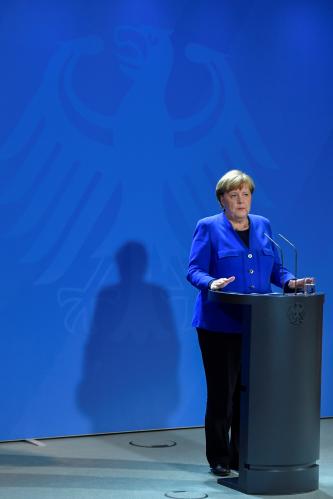If you’re a reporter, sign up here to receive emails for future on-the-record media calls with Brookings experts.
The global outbreak of COVID-19 continues to pose significant challenges to public health, the international economy, and national politics across the globe, with Europe now at the center of the crisis. The European Union has announced a sweeping travel ban, shutting external borders. There have been closures inside the EU, as well, with several European countries on full lockdown.
On March 20, experts from the Center on the United States and Europe joined an on-the-record call with reporters to discuss developments in Europe broadly, and in Italy, Germany, and the U.K. in particular.
 Thomas Wright (@thomaswright08), Director and Senior Fellow in the Center on the United States and Europe: “The EU does not have public health in its competency; it’s not a core competency of the Union. What we’ve seen, basically, so far is that almost all of the action in Europe is at the domestic national level. Countries are dealing with this on their own. There’s very little focus on the EU level, with one exception, which is unsurprisingly President Macron of France, who asked for regular teleconference calls European Council level and put those on the agenda. If it wasn’t for that we’d be, I think, seeing very little action in terms of the public health sphere because they’re all dealing with major national crises that they’re trying to focus on.”
Thomas Wright (@thomaswright08), Director and Senior Fellow in the Center on the United States and Europe: “The EU does not have public health in its competency; it’s not a core competency of the Union. What we’ve seen, basically, so far is that almost all of the action in Europe is at the domestic national level. Countries are dealing with this on their own. There’s very little focus on the EU level, with one exception, which is unsurprisingly President Macron of France, who asked for regular teleconference calls European Council level and put those on the agenda. If it wasn’t for that we’d be, I think, seeing very little action in terms of the public health sphere because they’re all dealing with major national crises that they’re trying to focus on.”
 Amanda Sloat (@A_Sloat), Robert Bosch Senior Fellow in the Center on the United States and Europe: “The U.K., interestingly, has been seen as a laggard in Europe in terms of its response to the crisis more generally, but was actually the first country to come out and decide to postpone local and mayoral elections in England. Those were expected to be held on May 7, and actually last week on March 13 the government came out to announce that decision. Second, related to the U.K., as I mentioned they have been seen somewhat as an outlier in Europe in terms of their response…focusing much more on this idea of herd immunity and a phased quarantine…[Third], one of the potential casualties for this in the U.K. seems to be the impact on Brexit. One of the big questions then is, what ends up happening with negotiations and the transition period.”
Amanda Sloat (@A_Sloat), Robert Bosch Senior Fellow in the Center on the United States and Europe: “The U.K., interestingly, has been seen as a laggard in Europe in terms of its response to the crisis more generally, but was actually the first country to come out and decide to postpone local and mayoral elections in England. Those were expected to be held on May 7, and actually last week on March 13 the government came out to announce that decision. Second, related to the U.K., as I mentioned they have been seen somewhat as an outlier in Europe in terms of their response…focusing much more on this idea of herd immunity and a phased quarantine…[Third], one of the potential casualties for this in the U.K. seems to be the impact on Brexit. One of the big questions then is, what ends up happening with negotiations and the transition period.”
 Giovanna De Maio (@GiovDM), Visiting Fellow in the Center on the United States and Europe: “The government has issued 25 million euros to support small- and medium- enterprises, to families, and of course to the health care system with the employment of nurses and doctors. [Italy has] also called back doctors who have retired in order to help, especially in the “red zone” where the situation is extremely critical. On the economic side…the government has said it’s going to be using the so-called “golden power,” meaning that it can stop foreign direct investment in strategic sectors in order to prevent Italy’s strategic sectors from being taken over by foreign companies. So [that is a] protectionism measure. Lastly, on international relations, Italy indeed has been turning to the EU for economic support and I think there has been a lot of understanding from the European Union’s perspective as far as quantitative easing…of course, the number one priority is securing protective medical gear, especially face masks. They will be coming this weekend from Turkey, Egypt, Germany, Brazil and China.”
Giovanna De Maio (@GiovDM), Visiting Fellow in the Center on the United States and Europe: “The government has issued 25 million euros to support small- and medium- enterprises, to families, and of course to the health care system with the employment of nurses and doctors. [Italy has] also called back doctors who have retired in order to help, especially in the “red zone” where the situation is extremely critical. On the economic side…the government has said it’s going to be using the so-called “golden power,” meaning that it can stop foreign direct investment in strategic sectors in order to prevent Italy’s strategic sectors from being taken over by foreign companies. So [that is a] protectionism measure. Lastly, on international relations, Italy indeed has been turning to the EU for economic support and I think there has been a lot of understanding from the European Union’s perspective as far as quantitative easing…of course, the number one priority is securing protective medical gear, especially face masks. They will be coming this weekend from Turkey, Egypt, Germany, Brazil and China.”
 Constanze Stelzenmüller(@ConStelz), Senior Fellow in the Center on the United States and Europe: “The issues before the German government now are three. One is using economic stimulus and other tools at its command to prevent a mass joblessness, a crash of the German economy. As Tom said accurately, we should have the resources to do that. Still, it’s a historic task and that is why the German finance and economics minister this week spoke of pulling out the bazooka. The second big issue is medical supplies and making sure the medical system works. There, Germany is at the top of the list of European countries in terms of ICU beds, at about 25,000 to 28,000. It’s still not clear that that will be enough at current infection rates…I think the third issue that might become one, we’re not seeing it yet, is simply keeping public order.”
Constanze Stelzenmüller(@ConStelz), Senior Fellow in the Center on the United States and Europe: “The issues before the German government now are three. One is using economic stimulus and other tools at its command to prevent a mass joblessness, a crash of the German economy. As Tom said accurately, we should have the resources to do that. Still, it’s a historic task and that is why the German finance and economics minister this week spoke of pulling out the bazooka. The second big issue is medical supplies and making sure the medical system works. There, Germany is at the top of the list of European countries in terms of ICU beds, at about 25,000 to 28,000. It’s still not clear that that will be enough at current infection rates…I think the third issue that might become one, we’re not seeing it yet, is simply keeping public order.”
The Brookings Institution is committed to quality, independence, and impact.
We are supported by a diverse array of funders. In line with our values and policies, each Brookings publication represents the sole views of its author(s).










Commentary
Brookings experts comment on the COVID-19 outbreak in Europe
March 23, 2020